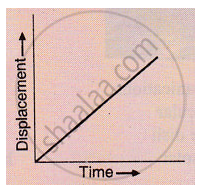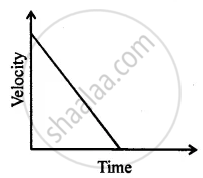Advertisements
Advertisements
प्रश्न
A car starting from rest acquires a velocity 180m s-1 in 0.05 h. Find the acceleration.
उत्तर
Here, final velocity = 180 m/s
Initial velocity = 0 m/s
Time taken = 0.05 h or 180 s
Acceleration = (Final Velocity - Initial Velocity)/time
= (180-0)/180 m s-2
= 1 m s-2
APPEARS IN
संबंधित प्रश्न
What conclusion can you draw about the velocity of a body from the displacement-time graph shown below :

Explain why, the motion of a body which is moving with constant speed in a circular path is said to be accelerated.
A bus running at a speed of 18 km/h is stopped in 2.5 seconds by applying brakes. Calculate the retardation produced.
Derive the formula s= `ut+1/2at^2` , where the symbols have usual meanings.
When a car driver travelling at a speed of 10 m/s applies brakes and brings the car to rest in 20 s, then retardation will be :
Define velocity. State its unit.
Give one example of following motion :
Variable acceleration
Multiple choice Question. Select the correct option.
At the maximum height, a body thrown vertically upwards has :
Can you suggest a real-life example about the motion of a body from the following velocity – time graph?

How will the equations of motion for an object moving with a uniform velocity change?
